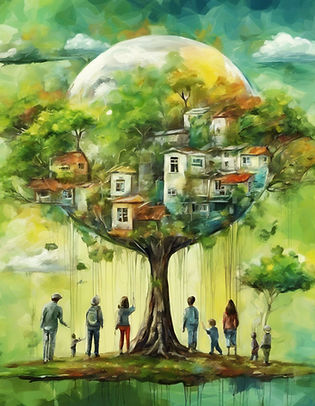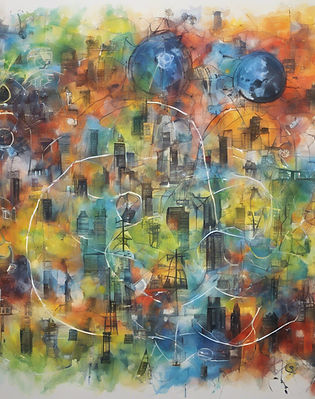
Later May be Too Late

Exploring AI in Sustainability
Depending on where you live, the private sector in your country contributes between 40% and 75% towards your nation's GDP (IMF 2022 data). In the United States it's above 75%. We can't get there without Corporations and SMEs pulling their weight and more, both individually and collectively, starting now, Government regulations and other mechanisms of adult supervision notwithstanding. Without that there is no viable path to a viable future.
Even where Corporations' and SMEs' sense of urgency and willingness to act is high, action does not automatically follow, due to the lack of the necessary capability, skills, technology and tools. AI could be that once is a civilization technologies that could change all that.
Like you, I perpetually fret over my lack of agency over the biggest ever global (and local) emergency. Putting out yet another digital stream of consciousness may not change anything, but perhaps by focusing on AI enabled Sustainability actions, ideas for practical applied actions might emerge. This is a personal journal on sustainability, climate change and technology, a scratch pad of information, facts, half-baked ideas, better-formed ideas and plenty of speculation.
The first posts are a regurgitation of what we already know very well, that our boat is leaking. Beyond that the focus will be almost entirely on Corporate Sustainability and AI.
Later may be too late
Some problems are just too difficult to comprehend, too big, too nebulous. And It’s a lot easier to look away than confront them.
The Global Footprint Network estimates that we have already exceeded our planetary regenerative capacity by at least 70%. By 2030 we will need two earths to sustain us. As per founder Mathis Wackernagel, while ponzi schemes are illegal everywhere in the world, our take-make-waste economy, the biggest ponzi scheme of all, has been running unchecked and ignored for over a hundred and fifty years.

Second Sight
We don't see our Cognitive Blindness. We are blind to our blindness.
Short-termism and localized thinking dominates our lives.
For the last 100,000 years our survival did not require us to see distant time, or develop a feel for exponential change, intuit large systems, or sense slow change. This cognitive blindness is hardwired into our human operating system. We can't "perceive" complex systems, such as our climate and ecological systems. They are too big, complex, too abstract. And worse, we don’t see our blindness. We are blind to our blindness.

It’s 2100
We are still here. We have avoided the worst impacts of climate change.

Systems and Ecosystems
A system that enables and encourages the accumulation of wealth to the point where thirty people have more wealth than half of humanity is not a sustainable system. Its feedback loop is malfunctioning.
Sustainability needs system wide dynamic balance. Dynamic balance requires a closed loop. Any climate action needs to be based on an understanding of closed loop systems in dynamic balance.
Our cultural conditioning has burnt into our epigenetics a collective aversion to the idea of balance. We crave continuous unsustainable growth.

AI, Climate, and the Narrow Path to Abundance
Can a redefined NetZero AI, much more powerful than anything we can imagine today, help us chart us a path back from the brink of climate and environmental catastrophe, into a brave new world of abundance?
* this post was written by me for Gyanai.com
Wrapping our heads around AI’s energy demand and the impact on climate is tougher than one might imagine. Too many moving parts. Too many points of view and too many collapsed forecasting models in the face of the blistering pace of change, where decades have been compressed into months.
...AI’s rising energy demand doesn’t exist in isolation. It is influenced by self-reinforcing feedback loops, global politics, our dependence on technology as if it were oxygen, the hubris of technologists, the resistance of anti-capitalist climate activists, and our collective will, or lack thereof, to safeguard our long-term viability.

Try These Links

2
Emissions Estimator
Provide a few details of a product and you will get an estimate of its total life cycle emissions, including the upstream supply chain emissions and emissions in the use and end of life phase.
3
Scope 3 Estimator
Scope 3 Estimator... Under Construction
Get in Touch
I'd love to hear from you and chat about all things Corporate Sustainability! Please feel free to reach out using the form or connect on LinkedIn.

